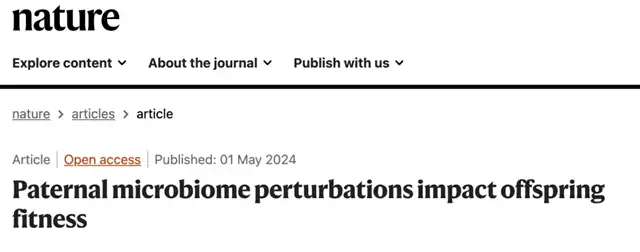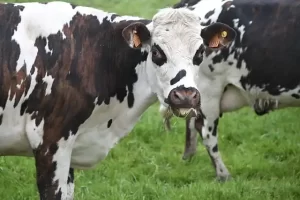Paternal Microbiome Perturbations Impact Offspring Fitness
- “Miracle Weight-Loss Drug” Sweeps Across America
- The United States Avian Influenza Outbreak Worse Than Expected?
- Global First: Bovine Avian Influenza Transmission to Humans Detected
- Potassium-Enriched Salt Substitutes: Reducing Blood Pressure Risk?
- Tritium Detection in Fukushima’s Seawater: Below Safety Standards
- What Reason Let AstraZeneca Withdraws COVID Vaccine From The Market?
Paternal Microbiome Perturbations Impact Offspring Fitness
- AstraZeneca Admits for the First Time that its COVID Vaccine Has Blood Clot Side Effects
- Was COVID virus leaked from the Chinese WIV lab?
- HIV Cure Research: New Study Links Viral DNA Levels to Spontaneous Control
- FDA has mandated a top-level black box warning for all marketed CAR-T therapies
- Can people with high blood pressure eat peanuts?
- What is the difference between dopamine and dobutamine?
- How long can the patient live after heart stent surgery?
Paternal Microbiome Perturbations Impact Offspring Fitness
Father’s Gut Microbiome Can Impact Offspring’s Health, Increasing Risk of Low Birth Weight, Severe Growth Restriction, and Premature Death.
Sperm transmits genetic information to the next generation in the form of DNA sequence and epigenetic information (non-DNA sequence-based). Epigenetic components (including chromatin state, small RNAs, and large molecular substances) can be modified in the preconceptional environment and affect offspring phenotype. However, the extent and potential mechanisms of paternal genetic and epigenetic effects in mammals are still unclear, and how environmental factors converge and signal to germ cells is also unclear.
The gut microbiota is increasingly recognized for its dominant role in integrating environmental signals into host responses. In fact, mammals spend their entire lives with gut microbiota, which play important roles in metabolism, hormone function, and immunity, meaning hosts use a healthy microbiota to maximize adaptability. However, the composition of the gut microbiota is still profoundly influenced by environmental factors (such as diet and drugs), thus, the loss of gut microbiota diversity associated with modernization poses risks to human health.
Although there is growing evidence that gut microbiota dysbiosis can trigger physiological responses in various tissues, we know little about the effects of gut microbiota disturbance on germ cells.
On May 1, 2024, researchers from the European Molecular Biology Laboratory (EMBL) published a study in the prestigious academic journal Nature titled “Paternal microbiome perturbations impact offspring fitness.”
The study confirmed that disruption of the male mouse gut microbiome could affect the health of its offspring, increasing the risk of low birth weight, severe growth restriction, and premature death in offspring. The study defined a “gut-reproductive axis” regulatory mechanism in males that is sensitive to environmental exposure and regulates offspring adaptability by influencing placental function.

In this study, the research team established an inducible model of gut microbiota dysbiosis in isogenic male mice using freely available non-absorbable antibiotics (nABX). These nABX cannot penetrate gastrointestinal epithelial cells, so any reproductive response reflects acute disruption of the gut microbiota, not systemic drug exposure.
16S ribosomal RNA sequencing showed that six weeks of low-dose nABX treatment led to a significant decrease in the diversity, abundance, and richness of the gut microbiota, a change that was reversible and gradually restored after stopping nABX treatment for eight weeks. Six weeks of nABX-induced gut microbiota dysbiosis had no significant effect on male weight, fertility, or survival. Additionally, mass spectrometry detected no nABX in the circulating blood and testes, confirming their specific action in the gut.
Further research showed that offspring of these male mice with gut microbiota dysbiosis had a higher probability of low birth weight, severe growth restriction, and premature death.
The increased disease risk in these offspring was caused by widespread gut microbiota disturbances transmitted through germ cells but could be alleviated by restoring the paternal gut microbiota before conception. This effect is related to the male reproductive system’s response to gut microbiota dysbiosis, including impaired hormone signaling and altered testicular metabolite characteristics. The research team believes that this response may increase the risk of placental insufficiency. Restoring the disrupted paternal microbiota before conception can reduce the risk of poor offspring health associated with paternal gut microbiota dysbiosis. This finding suggests that the deteriorating offspring health associated with paternal gut microbiota dysbiosis is an epigenetic effect rather than a genetic effect.
Finally, the research team stated that the gut microbiota is a crucial interface between the preconceptional environment of the male mouse and offspring health. These findings highlight the importance of understanding how environmental factors influence complex biological systems across scales—from direct molecular reactions to intergenerational disease susceptibility.
Paper link: https://www.nature.com/articles/s41586-024-07336-w
Paternal Microbiome Perturbations Impact Offspring Fitness
(source:internet, reference only)
Disclaimer of medicaltrend.org
Important Note: The information provided is for informational purposes only and should not be considered as medical advice.



